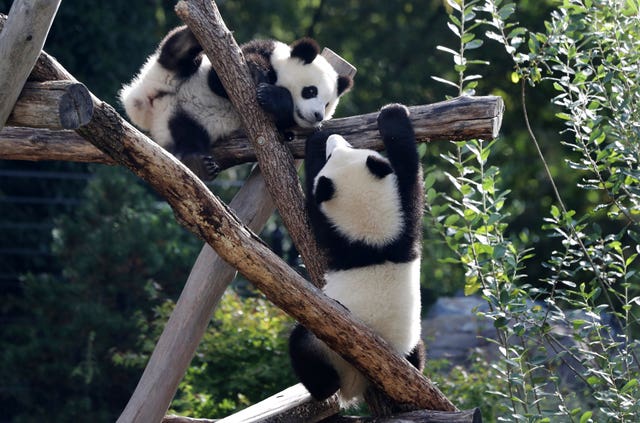Berlin Zoo has announced that long-time resident giant panda Meng Meng has given birth to twins — for a second time.
The cubs were born on Thursday and are doing well, the zoo said in a statement.
They were born only 11 days after ultrasound scans showed that Meng Meng, 11, was pregnant.

Their sex has not yet been determined “with certainty”.
“Now it’s time to keep your fingers crossed for the critical first few days,” the zoo said.
The cubs weigh just 6oz and 4.8oz and are about 5.5in long.
As with other large bears, giant pandas are born deaf, blind and pink. Their black-and-white panda markings only develop later.
“I am relieved that the two were born healthy,” zoo director Andreas Knieriem said. “The little ones make a lively impression and mum Meng Meng takes great care of her offspring.”

The zoo said giant pandas usually only raise one cub when they give birth to twins, so it will “actively support” Meng Meng in co-operation with two experts from China’s Chengdu Research Base of Giant Panda Breeding who are in the German capital.
“With around 20 births a year, they have much more experience and are better able to assess development,” panda curator Florian Sicks said.
The cubs will alternate being with their mother every two to three hours to drink milk and are otherwise being cared for in an incubator donated by a Berlin hospital.
Meng Meng and male panda Jiao Qing arrived in Berlin in 2017, and in August 2019, Meng Meng gave birth to Pit and Paule, also known by the Chinese names Meng Xiang and Meng Yuan, the first giant pandas born in Germany.

The twins were a star attraction in Berlin, but they were flown to China in December — a trip that was contractually agreed from the start but delayed by the Covid-19 pandemic.
China gave friendly nations its unofficial mascot for decades as part of a “panda diplomacy″ policy. The country now loans pandas to zoos on commercial terms.
Giant pandas have difficulty breeding and births are particularly welcomed. The zoo noted that female pandas are only fertile for about 72 hours per year.
There are about 1,800 pandas living in the wild in China and a few hundred in captivity worldwide.
Meng Meng was artificially inseminated in March.
The new arrivals and their mother will not be on show to the public for the time being, but visitors can still see Jiao Qing, 14, as male pandas do not get involved in rearing cubs.





Why are you making commenting on The Herald only available to subscribers?
It should have been a safe space for informed debate, somewhere for readers to discuss issues around the biggest stories of the day, but all too often the below the line comments on most websites have become bogged down by off-topic discussions and abuse.
heraldscotland.com is tackling this problem by allowing only subscribers to comment.
We are doing this to improve the experience for our loyal readers and we believe it will reduce the ability of trolls and troublemakers, who occasionally find their way onto our site, to abuse our journalists and readers. We also hope it will help the comments section fulfil its promise as a part of Scotland's conversation with itself.
We are lucky at The Herald. We are read by an informed, educated readership who can add their knowledge and insights to our stories.
That is invaluable.
We are making the subscriber-only change to support our valued readers, who tell us they don't want the site cluttered up with irrelevant comments, untruths and abuse.
In the past, the journalist’s job was to collect and distribute information to the audience. Technology means that readers can shape a discussion. We look forward to hearing from you on heraldscotland.com
Comments & Moderation
Readers’ comments: You are personally liable for the content of any comments you upload to this website, so please act responsibly. We do not pre-moderate or monitor readers’ comments appearing on our websites, but we do post-moderate in response to complaints we receive or otherwise when a potential problem comes to our attention. You can make a complaint by using the ‘report this post’ link . We may then apply our discretion under the user terms to amend or delete comments.
Post moderation is undertaken full-time 9am-6pm on weekdays, and on a part-time basis outwith those hours.
Read the rules here